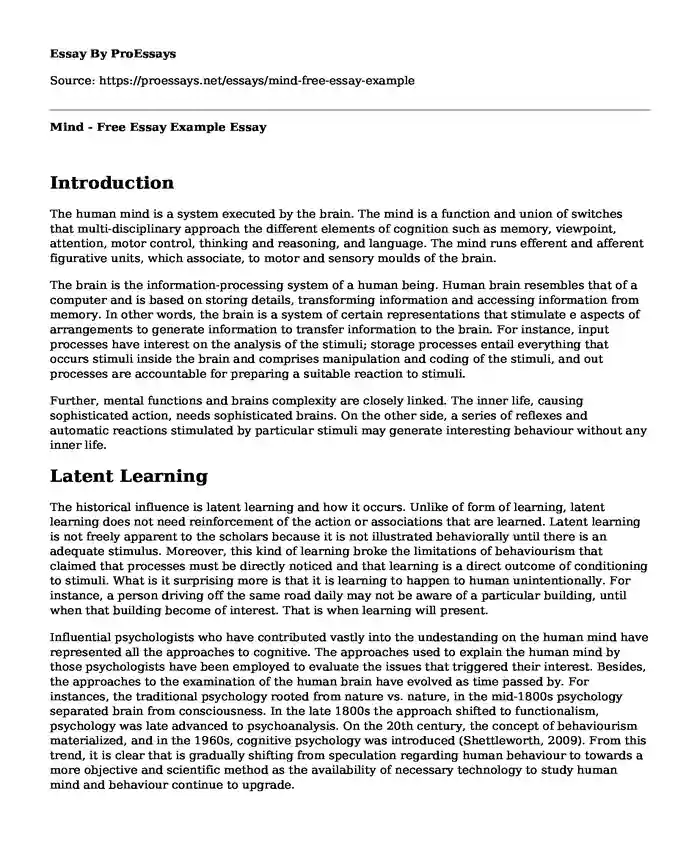Introduction
The human mind is a system executed by the brain. The mind is a function and union of switches that multi-disciplinary approach the different elements of cognition such as memory, viewpoint, attention, motor control, thinking and reasoning, and language. The mind runs efferent and afferent figurative units, which associate, to motor and sensory moulds of the brain.
The brain is the information-processing system of a human being. Human brain resembles that of a computer and is based on storing details, transforming information and accessing information from memory. In other words, the brain is a system of certain representations that stimulate e aspects of arrangements to generate information to transfer information to the brain. For instance, input processes have interest on the analysis of the stimuli; storage processes entail everything that occurs stimuli inside the brain and comprises manipulation and coding of the stimuli, and out processes are accountable for preparing a suitable reaction to stimuli.
Further, mental functions and brains complexity are closely linked. The inner life, causing sophisticated action, needs sophisticated brains. On the other side, a series of reflexes and automatic reactions stimulated by particular stimuli may generate interesting behaviour without any inner life.
Latent Learning
The historical influence is latent learning and how it occurs. Unlike of form of learning, latent learning does not need reinforcement of the action or associations that are learned. Latent learning is not freely apparent to the scholars because it is not illustrated behaviorally until there is an adequate stimulus. Moreover, this kind of learning broke the limitations of behaviourism that claimed that processes must be directly noticed and that learning is a direct outcome of conditioning to stimuli. What is it surprising more is that it is learning to happen to human unintentionally. For instance, a person driving off the same road daily may not be aware of a particular building, until when that building become of interest. That is when learning will present.
Influential psychologists who have contributed vastly into the undestanding on the human mind have represented all the approaches to cognitive. The approaches used to explain the human mind by those psychologists have been employed to evaluate the issues that triggered their interest. Besides, the approaches to the examination of the human brain have evolved as time passed by. For instances, the traditional psychology rooted from nature vs. nature, in the mid-1800s psychology separated brain from consciousness. In the late 1800s the approach shifted to functionalism, psychology was late advanced to psychoanalysis. On the 20th century, the concept of behaviourism materialized, and in the 1960s, cognitive psychology was introduced (Shettleworth, 2009). From this trend, it is clear that is gradually shifting from speculation regarding human behaviour to towards a more objective and scientific method as the availability of necessary technology to study human mind and behaviour continue to upgrade.
Conclusion
Field of human psychology continues to evolve, and new concepts are substituting the older once. In the coming future, it will be ridiculous to psychologists to classify themselves with a single school of thought. Their ideas will be driven from a broad scope of theoretical backgrounds. Further, Richards (2019) affirms that technology serves a key role in how human utilize their memory. Psychologists have already noted human memory requires reference guide, calendars, and other applications from devices. Hence, it suggests that future studies are more likely to investigate how individuals choose what to remember and how they decide to remember it (Digitally or personally).
References
Richards, G. (2019). Human evolution: An introduction for the behavioural sciences (Vol. 10). Routledge. https://www.nature.com/articles/s41586-019-1138-y
Shettleworth, S. J. (2009). Cognition, evolution, and behavior. Oxford university press. https://books.google.co.ke/books?hl=en&lr=&id=M-JJPmGOJ1YC&oi.
Cite this page
Mind - Free Essay Example . (2023, Dec 12). Retrieved from https://proessays.net/essays/mind-free-essay-example
If you are the original author of this essay and no longer wish to have it published on the ProEssays website, please click below to request its removal:
- Three Ways that Are Important to Having a Happy Life
- Happiness During American Suburbanization Essay
- Vulnerability Stress-Adaptation Model Essay Example
- Critical Essay on Positive Psychology
- Findings of 2 Research Articles on Sociolinguistic Theory Paper Example
- Essay Example on Jane: A Life of Love and Loss
- Paper Example on University of Melbourne: Capitalize Opportunities and Create a Value Proposition







